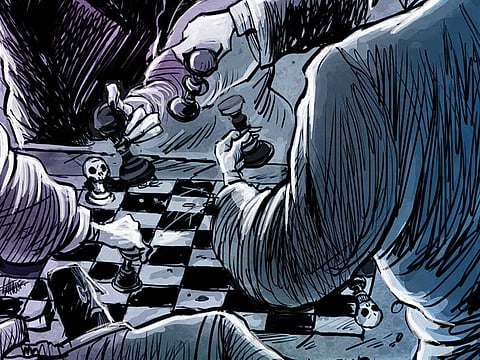Who controls the Syrian chessboard?
Two benchmarks — Astana II and Geneva IV — are on the table for the rival camps of the conflict

Amidst major differences, two important benchmarks are currently on the table for both camps in the Syrian conflict. One is Astana II, a two-day technical conference chaired by regional powers and scheduled to begin in the capital of Kazakhstan today. The other is the United Nations-mandated Geneva process, pencilled for February 23.
Astana II will be chaired by Russia, Turkey and Iran and will deal with the implementation of a nationwide ceasefire that had been agreed upon by the three big players last December. The first round of Astana was held late last month, believed to the brainchild of Russian President Vladimir Putin and his Turkish counterpart Recep Tayyip Erdogan. Visibly absent from the Astana process are major stakeholders in the Syrian conflict such as Saudi Arabia, Qatar, France, Britain — and the United States, which was only ceremonially represented in Astana I through the US ambassador to Kazakhstan.
Representing the Syrian opposition then and now are 13 influential rebel groups, headed by 47-year old Mohammad Alloush, commander of the powerful Islamic Army that controls the town of Douma in the Damascus countryside. None of the traditional political figures will be present at Astana II, which has created a major rift between the political opposition and the military groups. The Higher Negotiations Committee (HNC) was furious with Astana I and is equally unhappy with Astana II, namely because it was excluded from the talks but also because Russia is now using the “Astana Communique” as the official terms of reference for the entire political process and contrary to what the HNC desires, this makes no mention of a Transitional Government Body (TGB) that was specifically mentioned in Geneva I, back in 2012, and says nothing about the fate and future of the Syrian president. Instead, Astana focuses on UN Security Council Resolution 2254, which mandates a government of national unity, a new constitution, and early elections, without saying whether they will be presidential or parliamentary in nature. Leaders of the HNC believe that Moscow, Tehran and their former allies in Ankara have purposely sidelined them, with the aim of eventually squeezing them out of the political process and transforming them into advisers to the talks, rather than actual negotiators. After six years of war, these three players seem to have reasoned that it is far better to cut deals with the rebel groups — who are based inside Syria and have thousands of troops under their command, than to continue doing business with foreign-based opposition groups and civilian figures.
Everybody excluded from Astana II will have his eyes trained on Geneva IV. This is the original process, after all, mandated by the UN. It is where the new US Secretary of State, Rex Tillerson, will be present, along with all the countries that were absent in Astana. To find common ground with the Russians ahead of Geneva IV, the HNC has fired defected Syrian army officer Asaad Al Zoubi, who had chaired the first three rounds of Geneva because he was viewed as “anti-Russian” by the Kremlin. Replacing him will be Nasr Al Hariri of the Syrian National Coalition, a 40-year old medical doctor and former deputy in the Syrian parliament for the southern city of Daraa. Mohammad Sabra, an independent lawyer who is close to HNC Chairman Riad Hijab, will replace Mohammad Alloush as “top negotiator”. The HNC has also agreed to expand its delegation to 21-members, giving 11 seats to the civilian politicians and ten to the military groups from both the southern and northern fronts — but only those who did not attend Astana II. In addition to the five core members of the Syrian National Coalition, three figures from the Moscow-backed National Coordination Committee will be present, along with two figures from Russian-backed and Egyptian-backed groups, generally regarded as “soft” opposition that is less radical than their Saudi-backed colleagues. All of them attended previous rounds of Geneva as “advisers” rather than negotiators, and Moscow insisted on putting them on equal footing with the Saudi-backed HNC, to break its hegemony over the political process.
All indicators point to a very bumpy start for both Astana II and Geneva IV. Battlefield developments will determine who controls what in the Syrian chessboard and what that means for negotiators in Astana and Geneva. A multi-pronged race is already underway for Al Raqqa, the self-proclaimed “capital” of Daesh (the self-proclaimed Islamic State of Iraq and the Levant), between Russian and Syrian Armies on one front, the US-backed Syrian Democratic Forces on another, and Erdogan, who is determined not to grant victory to either Damascus or the Kurds. He has set up an all-Arab force of 20,000 tribesmen to push towards the city and now wants to include it within Turkey’s no-fly zone, an ambitious project in which he would like to include the border city of Jarablus (occupied last August by the Turks), Manbij, 30km west of the Euphrates, Azaz, 32km northwest of Aleppo, and Al Bab, a strategic town in the Aleppo governorate, the scene of current advances by Turkish and Syrian troops.
Another major hurdle will be the HNC’s insistence that all negotiators have to abide by its roadmap for Syria, which calls for departure of the Syrian president, saying that he cannot be part of the country’s future, and for the expulsion of all foreign troops, including those of Iran and Hezbullah, from Syria before any transitional period kicks off — two conditions that all the Moscow-backed opposition will refuse to uphold, which may bring down the talks before they even start.
Sami Moubayed is a Syrian historian and former Carnegie scholar. He is a Research Fellow at the Syrian Studies Centre at St Andrews University.



